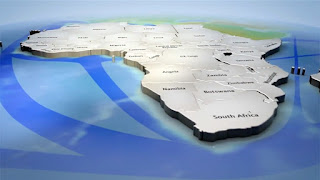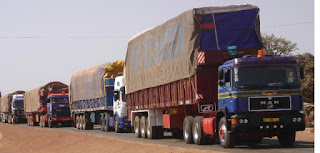Removing Trade Barriers amongst Counties in West Africa
Removing
Trade Barriers amongst Counties in West Africa
By E. Stanley Ukeni
My passion for this topic is born out of my belief that
regional trade between West African countries would play a crucial role in in
guarantying the future prosperity of the more than three hundred and sixty-six
million inhabitants of the West African region.
After reading this post I hope you would decide to join the
initiative to facilitate the permanent removal of cross-border trade barriers
between member States which is being championed by ECOWAS and the West African
Economic and Monetary Union.
As we may all already be aware of, the ECOWAS organization
was established to encourage trade liberalization amongst West African
countries. The acronym (ECOWAS) literal stands for Economic Community of West
African States.
And according to the second chapter of the organization’s
mission statement, the stated goals of the regional institution includes;
·
Enabling social and economic integration and
political cooperation amongst West African States.
·
Giving rise to an economic union in West Africa
as a means of improving the living standards of its peoples.
·
Maintaining and enhancing economic stability.
·
Sustaining relations between member States—with
an aim to scale this initiative continental-wide.
However, as should be obvious to even a most casual
observer, the organization is yet to actualize this stated goal of regional
economic integration.
It is unfortunate that the ECOWAS region has maintained a
meager ten to fifteen percent intra-regional trade volumes since the inception
of the regional economic bloc in 1975, while the likes of the European Union,
the North American Free Trade Agreement and the South American Economic
Organization has spurred an impressive intra-regional trade volumes well in the
excess of seventy percent.
We can all attest to
the fact that some of the main impediments to effective cross-border trade
include, road harassment, demands for bribes, export restrictions, certificate
of origins, veterinary certificates and value added taxes on foodstuffs.
Needless to say that the above mentioned challenges contribute immensely to the
often incessant bottlenecks that regional importers and exporters face at
border posts.
With this in mind, we urge ECOWAS member countries to
accelerate their efforts at harmonizing and implementing national economic
policies that remove all barriers impeding trade and commerce within the
African sub-region—with an aim of enhancing regional trade and spurring
economic growth.
Although ECOWAS member States have entered into numerous
trade and economic protocols, conventions and agreements, there has been a lack
of political will on the part of many of the governments of member States to
enforce their implementation.
Examples of these agreements and protocols include; the
ECOWAS Trade Liberalization Scheme—a protocol which allows citizens of member
countries to move freely between member countries, with their goods, without
obstacle or tariffs; ECOWAS protocol/ supplementary protocol on free movement of
persons, residence and establishment; ECOWAS convention on inter-State road
transportation; and Convention on mutual administrative assistance on customs
matters.
Although these agreements, protocols and conventions remains
legally binding on paper, the unfortunate lack of political desire, on the part
of requisite State authorities to implement these multilateral agreements and
conventions that they are signatories to, have rendered the protocols inert and
ineffective at best.
In light of the above mentioned challenges, we here offer
the following recommendations as part of our effort to contribute to the reform
agenda needed to address the wide range of constraints and challenges impeding
liberalized cross-border trade and commerce amongst ECOWAS countries;
·
We are of the opinion that across the board
trade liberalization and harmonization policies has to involve the reduction of
the steep financial costs of clearing goods, and the streamlining of customs
practices in other to reduce the time spent on clearing goods would help
alleviate some of the key challenges that mitigate against effective
intra-regional trade—including tariff and non-tariff barriers.
·
We feel that it is not enough to merely focus on
the phasing out of tariffs on food produce and goods manufactured within the
region, it is equally necessary to address the constraints to effectively move
goods across borders. This calls for regulatory and customs reforms, and the
needs for adequate training of regulatory enforcers.
·
We feel that it is essential that the economic
integration agenda cover issues pertaining to the service sector, as much as it
does the free movement of goods. This is because the service sector in very
important to raising the quality of living of the citizenry. Qualified
individuals must be able and easily relocate to where the jobs are.
·
In other to achieve the above mentioned
objective, member States need to evolve standard regulatory frameworks for
accrediting the qualifications of professionals. This would enable highly
qualified African doctors, nurses, teacher, engineers and lawyers to practice
anywhere in the sub-region, irrespective of their nation of origin.
Even as we highlight some of the challenges and constraints
hindering intra-regional trade and commerce in the West African sub-region,
there are a number of noteworthy developments that needs to be acknowledged.
In November 3rd of 2015, the government of Côte
d’Ivoire issued a directive prohibiting its border officials from demanding
certificate of origins for agricultural produce being imported into the country.
On the 3rd of February 2016, Burkina Faso’s
customs office issued a new policy directive that effectively bans border
officials from demanding certificate of origin for agricultural importers at
Burkinabe borders.
In recent months, the Federal Republic of Nigeria and the
Niger Republic inaugurated the Zinder-Daura-Jigawa-Kano trade corridor in other
to stimulate free trade between the two countries. The much needed cross-border
trade would accord the citizens of both countries access to agricultural,
livestock and manufactured goods at competitive price.
These new trade policy directives will greatly facilitate
the free movement and trade of food crops between Burkina Faso and Côte
d’Ivoire there by putting downwards pressure on the cost of food in both
countries.
Although these are small steps, they are nonetheless steps
in the right direction. We hope other West African States emulate these
laudable examples—because the hope of delivering sustainable prosperity to the citizenry
of West African States depends on it.
Authored by E. Stanley Ukeni, Copyright © 2016. All
Rights Reserved.
You are invited to follow E. Stanley Ukeni on
twitter at; @EzStan . I invite you to equally follow me on google+







Comments
Post a Comment